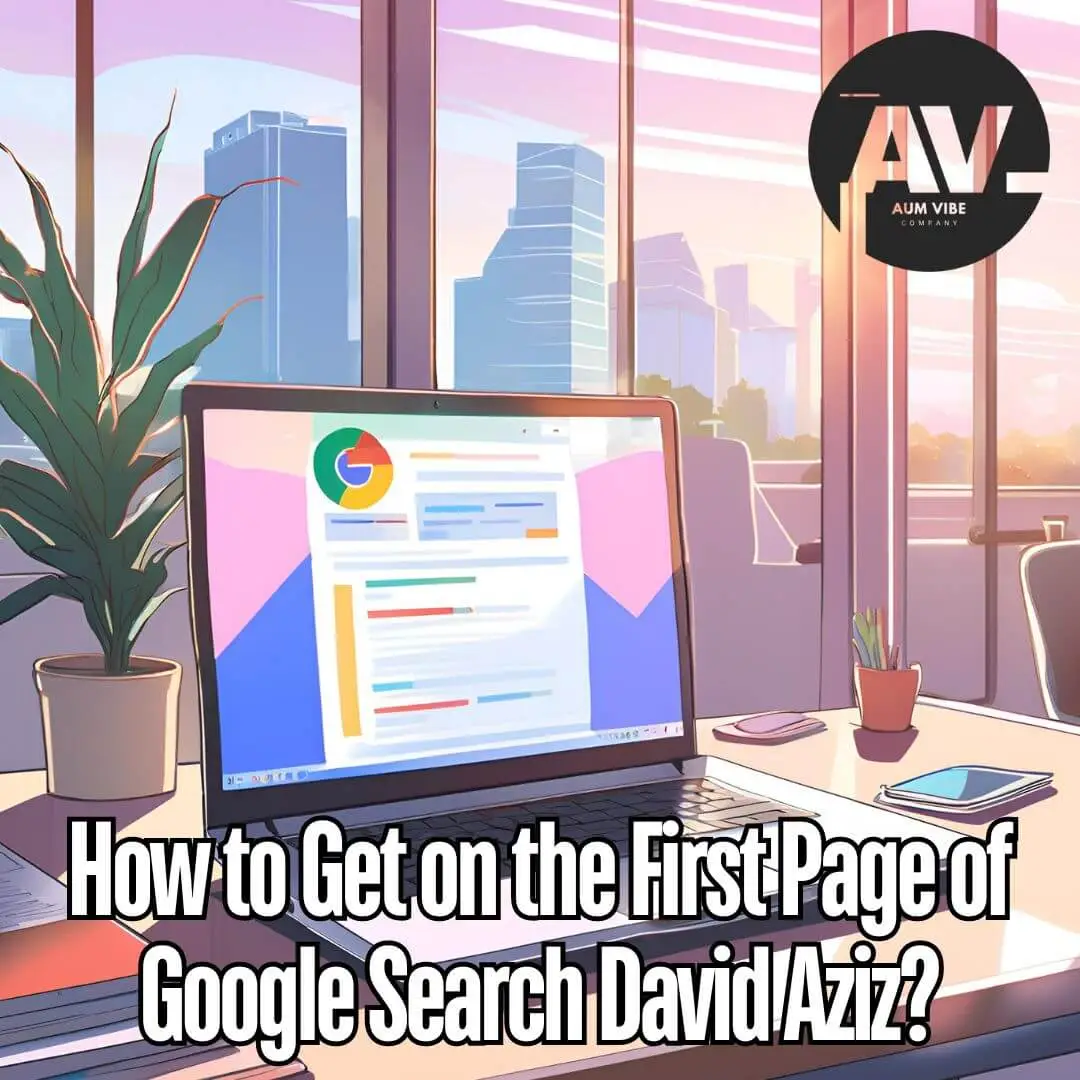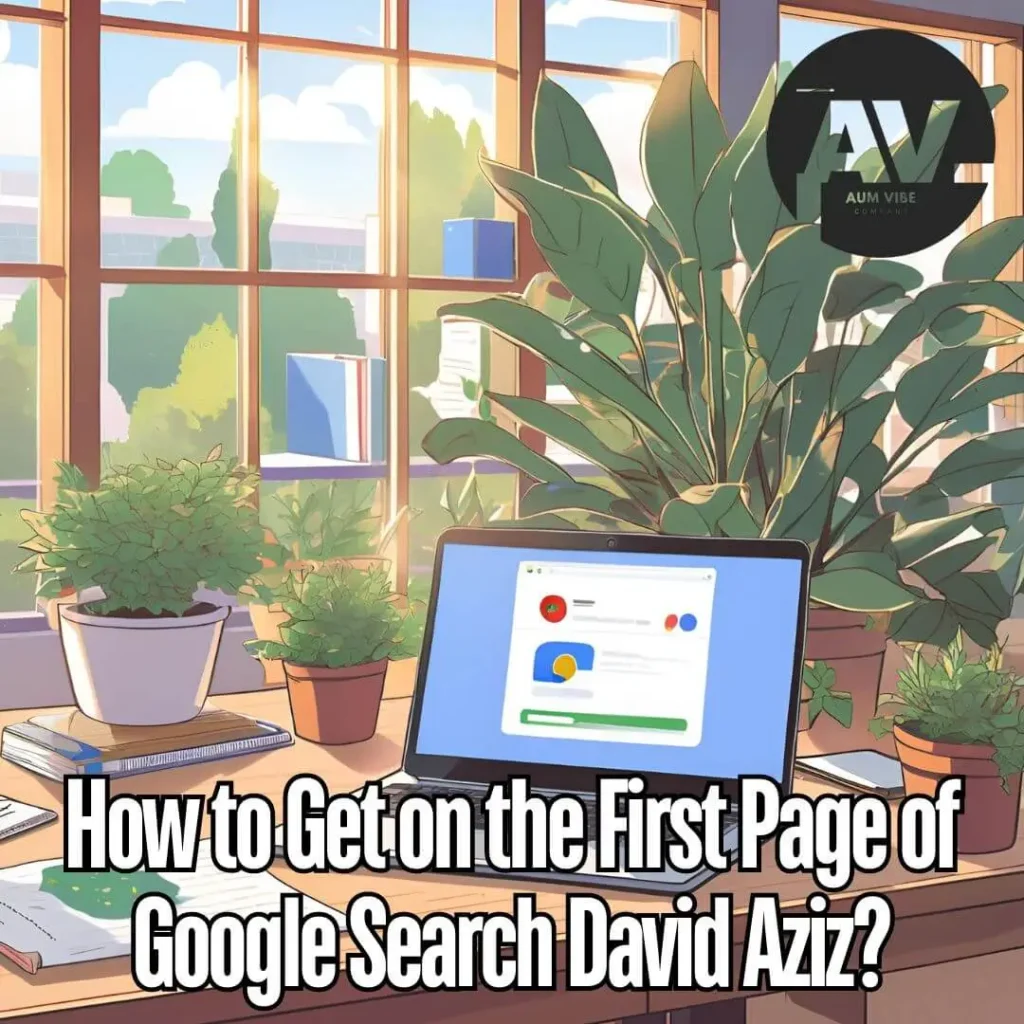
How to Get on the First Page of Google Search David Aziz?
Do you want to know “How to Get on the First Page of Google Search David Aziz?” If so, then this article is for you. Getting on the first page of Google search is the ultimate goal for many businesses and digital marketers. So, how to Get on the First Page of Google Search David Aziz?
To get on the first page of Google search, David Aziz emphasizes optimizing for high-quality content, using targeted keywords, improving website speed, and ensuring mobile-friendliness. Additionally, building backlinks, focusing on user engagement, and implementing structured data can significantly boost your rankings.
It not only brings visibility but also significantly boosts website traffic, credibility, and sales. In this article, we will explore proven strategies by renowned SEO expert David Aziz on how to get on the first page of Google Search. Let’s dive into actionable tips, FAQs, and important techniques to help your website climb to the top of search engine rankings.
Why is It Important to Know How to Get on the First Page of Google Search David Aziz?
The importance of ranking on the first page of Google cannot be overstated. Studies reveal that over 75% of users never scroll past the first page of search results, making it a critical space for businesses to occupy.
David Aziz, an expert in digital marketing and SEO, points out that being on the first page not only improves visibility but also establishes authority and trust. Ranking high signals to users that Google finds your website relevant, which can lead to higher click-through rates (CTR) and conversions.
You may also like: Pedrovazpaulo Coaching
How to Get on the First Page of Google Search David Aziz?
Following are the prime steps that you can follow to rank on the first page of Google search according to expert seo David Aziz. These methods will help you get answer to “How to Get on the First Page of Google Search David Aziz?”
1. Proper Keyword Research
Effective keyword research is the cornerstone of SEO success. David Aziz emphasizes that finding the right keywords to target is crucial for improving your chances of ranking on the first page of Google. Here’s how you can do it:
- Use SEO Tools: Tools like Google Keyword Planner, Ahrefs, and SEMrush can help you identify high-traffic keywords relevant to your niche.
- Focus on Long-Tail Keywords: These keywords have lower competition but are more specific to your target audience. For example, instead of using a general keyword like “SEO,” you might target “SEO tips for small business websites.”
- Analyze Competitors: Identify the keywords your competitors are ranking for and find gaps where you can outrank them with better content.
2. Create High-Quality
David Aziz stresses that “content is king” when it comes to SEO. The key is to create valuable, engaging, and relevant content that answers user queries and adds value. Follow these tips:
- Understand User Intent: Research what your audience is searching for and create content that meets their needs.
- Regular Updates: Regularly update your content to ensure it remains relevant. This signals to Google that your website is active, which can improve rankings.
- Use Visuals: Include images, videos, and infographics to make your content more engaging. Visual content keeps users on your page longer, improving your dwell time, a ranking factor.
3. On-Page SEO
On-page SEO is critical to improving your rankings. David Aziz recommends optimizing the following elements for better visibility:
- Title Tags: Ensure your page titles include your primary keyword and are descriptive.
- Meta Descriptions: Write engaging meta descriptions that include the main keyword. These will help improve your CTR, which Google considers a ranking factor.
- Header Tags (H1, H2, H3): Use headers to structure your content, making it easier for search engines and users to navigate.
- URL Structure: Keep URLs short and include your primary keyword to make it more search engine-friendly.
4. Do Proper Internal Linking
Internal linking is often an overlooked aspect of SEO but is a key factor in getting on the first page of Google. Internal links connect various pages on your website, helping search engines understand the structure and hierarchy of your content. David Aziz advises creating a solid internal linking strategy to enhance user experience and improve search engine crawlability.
Key internal linking practices include:
- Linking to relevant pages within your content to guide users toward more information.
- Using descriptive anchor text that naturally fits into the content and includes keywords.
- Ensuring your most important pages (such as cornerstone content) have the most internal links pointing to them.
- Regularly auditing your internal links to fix any broken or outdated links.
An effective internal linking strategy improves navigation, increases dwell time, and passes link equity, all of which contribute to better SEO performance.
5. Improve Website Speed
Google has made it clear that page speed and mobile-friendliness are key ranking factors. David Aziz recommends the following steps:
- Optimize Page Load Time: Use tools like Google’s PageSpeed Insights to identify areas where your site is slow. Compress images, leverage browser caching, and use content delivery networks (CDNs) to reduce load times.
- Mobile-First Design: With large number of traffic coming from mobile devices, your website must be mobile-friendly. Use responsive design to ensure your site works well on any device.
6. Do Proper Mobile Optimization
With mobile devices now accounting for over 50% of global web traffic, ensuring that your website is mobile-friendly is more important than ever. Google prioritizes websites that offer seamless experiences across all devices, especially mobile. David Aziz emphasizes the importance of having a responsive web design, which automatically adjusts your website’s layout to fit different screen sizes.
To improve mobile optimization, make sure that:
- Your site’s navigation is simple and easy to use on smaller screens.
- Touch elements are appropriately spaced to avoid accidental clicks.
- Images and content load quickly on mobile devices by using compressed files.
- Avoid intrusive pop-ups, which can negatively impact user experience and your ranking on mobile search results.
7. Build High-Quality Backlinks
Backlinks from credible, authoritative websites are essential for SEO. According to David Aziz, Google views backlinks as a vote of confidence for your site’s content. Here are some strategies to build high-quality backlinks:
- Guest Blogging: Write for authoritative websites in your niche and include a backlink to your site.
- Outreach: Reach out to influencers and bloggers to ask if they would link to your valuable content.
- Create Link-Worthy Content: Develop comprehensive guides, case studies, or original research that others in your industry would want to reference.
8. Fix Core Web Vitals
Google’s Core Web Vitals are metrics designed to measure the quality of a user’s experience on your website. These vitals focus on key aspects such as loading time, interactivity, and visual stability. Sites that perform well in these areas are more likely to rank higher on the first page of Google.
David Aziz stresses the importance of monitoring and improving your site’s Core Web Vitals to meet Google’s performance thresholds. The three main metrics to focus on are:
- Largest Contentful Paint (LCP): Measures loading performance and aims for the largest visible element to load within 2.5 seconds.
- First Input Delay (FID): Measures interactivity, targeting a delay of less than 100 milliseconds.
- Cumulative Layout Shift (CLS): Measures visual stability, aiming to avoid unexpected shifts in content while loading.
Improving your Core Web Vitals can be achieved by optimizing images, reducing third-party scripts, and using faster hosting services.
9. Schema Markup
Structured data, often referred to as schema markup, helps search engines better understand your website’s content. By adding this code to your site, you make it easier for Google to display rich snippets, which can significantly improve your click-through rate (CTR). Rich snippets include extra information, like reviews, product prices, and event dates, making your search result more attractive.
David Aziz advocates for using structured data to:
- Highlight product information (price, availability, reviews) in search results.
- Showcase event dates and locations directly in the SERP.
- Display FAQs or How-to instructions, offering users quick answers to their queries.
By optimizing for structured data, you increase the chances of your website appearing in featured snippets or knowledge panels, which often occupy the top of the search results page.
10. Improve User Engagement
Google’s algorithm considers user engagement metrics, such as bounce rate, dwell time, and click-through rate (CTR), when ranking websites. The more users engage with your content, the higher the chance your site has to rank on the first page.
David Aziz’s strategies often focus on making websites more interactive and valuable for visitors. Improving engagement can be done through:
- Providing clear calls-to-action (CTAs) that guide users on what to do next.
- Incorporating visual content such as videos, infographics, and interactive elements to keep users engaged.
- Offering related internal links to encourage users to explore other areas of your website.
- Regularly updating your content to ensure it remains relevant and valuable to your audience.
11. Optimize for Voice Search Queries
With the rise of voice search through digital assistants like Siri, Alexa, and Google Assistant, optimizing your content for voice search has become crucial. Voice queries are typically longer and more conversational than typed queries, so adjusting your SEO strategy to target these types of searches is important to rank higher on Google.
David Aziz suggests the following tactics to optimize for voice search:
- Focus on long-tail keywords and natural language that reflects how people speak.
- Ensure your content answers who, what, where, when, and how questions clearly and concisely.
- Use structured data to provide direct answers that can appear in voice snippets.
- Improve local SEO since voice searches are often location-based, with queries like “near me” being common.
Optimizing for voice search can help capture a growing segment of search traffic and improve your chances of ranking on the first page.

12. Use Social Proof
Social proof, such as customer reviews, testimonials, and social media shares, can indirectly impact your SEO by improving your site’s authority and user trust. While Google doesn’t directly use social signals as a ranking factor, David Aziz emphasizes that the indirect effects of social proof can lead to better rankings.
Here’s how social proof helps SEO:
- Reviews and Testimonials: Displaying positive reviews can increase user trust and encourage more clicks, which can improve your CTR—a ranking factor.
- Social Shares: Content that is widely shared on social media platforms can generate backlinks and referral traffic, both of which boost your SEO efforts.
- Case Studies and Success Stories: Publishing case studies or success stories demonstrates authority and can encourage other sites to link to your content.
Leveraging social proof can not only enhance your site’s reputation but also lead to better user engagement and higher rankings on Google.
13. Leverage Local SEO (For Local Businesses)
If you’re a local business, optimizing for local search is key. David Aziz advises the following strategies for local SEO:
- Claim and Optimize Google My Business: Ensure your business is listed and optimized with correct Name, Address, and Phone number (NAP) details.
- Local Citations: List your business in local directories and ensure NAP consistency.
- Encourage Reviews: Positive customer reviews on Google My Business and other platforms help boost your local SEO rankings.
14. Regularly Monitor SEO Performance
Monitoring your SEO performance is essential for long-term success. David Aziz recommends tools like:
- Google Analytics: Track where your traffic is coming from, monitor engagement, and evaluate which pages perform best.
- Google Search Console: Identify ranking issues, track keyword performance, and find opportunities for improvement.
- Ahrefs and SEMrush: Use these tools to monitor your backlink profile, track your keywords, and perform competitor analysis.
Key Strategies Regarding How to Get on the First Page of Google Search David Aziz
Here’s a table outlining the Key Strategies to get on the first page of Google search:
| Key Strategy | Description |
| High-Quality Content | Create informative, valuable, and unique content that satisfies user intent and answers their queries. |
| Targeted Keywords | Research and use relevant keywords strategically throughout your content, titles, and meta descriptions. |
| Website Speed Optimization | Improve page load speed by optimizing images, using efficient coding, and leveraging caching techniques. |
| Mobile-Friendliness | Ensure your website is responsive and provides a seamless experience across all devices, especially mobile. |
| Backlink Building | Acquire high-quality backlinks from reputable websites to boost domain authority and trustworthiness. |
| User Engagement | Enhance user experience with intuitive design, clear navigation, and interactive elements to reduce bounce rates. |
| Structured Data | Implement schema markup to help search engines understand and display your content more effectively. |
These strategies are key to improving SEO and securing a top spot on Google’s first page.
FAQs About How to Get on the First Page of Google Search David Aziz
Why is ranking on the first page of Google so important?
Ranking on the first page of Google ensures higher visibility and credibility, which can lead to increased website traffic and conversions.
How long does it take to rank on Google’s first page?
SEO is a long-term strategy. It typically takes 3-6 months to see significant improvements, depending on the competition and effort invested.
What is the role of keyword research in improving Google rankings?
Keyword research helps you target the search terms that your audience is using, increasing the likelihood of ranking for relevant queries.
How does content quality impact Google rankings?
Google prioritizes high-quality, relevant content that meets user needs. Well-structured, engaging content improves dwell time and reduces bounce rates, which positively impacts rankings.
What is the importance of backlinks in SEO?
Backlinks from reputable sites signal to Google that your content is trustworthy and authoritative, improving your chances of ranking higher.
Can optimizing for mobile devices improve my Google rankings?
Yes, Google favors websites that are mobile-friendly due to the significant amount of traffic coming from mobile devices.
What role does site speed play in ranking on Google?
A fast-loading site provides a better user experience and reduces bounce rates, both of which contribute to higher search rankings.
How can I improve my website’s local SEO?
By optimizing your Google My Business profile, ensuring NAP consistency, and encouraging customer reviews, you can improve your local SEO and appear in local search results.
What is on-page SEO, and why is it important?
On-page SEO involves optimizing elements like title tags, meta descriptions, and URL structure. It helps search engines understand your content and rank it accordingly.
How often should I update my SEO strategy?
SEO is an ongoing process. Regularly monitor your performance and make adjustments as search engine algorithms evolve.

Conclusion – How to Get on the First Page of Google Search David Aziz?
Ranking on the first page of Google doesn’t happen overnight. It requires a comprehensive SEO strategy that includes keyword research, high-quality content creation, on-page optimization, and backlink building.
David Aziz emphasizes that consistency, patience, and continual monitoring are essential. By applying these strategies, you can increase your chances of reaching Google’s first page and driving significant traffic to your website. Hopefully, now you have got the answer to “How to Get on the First Page of Google Search David Aziz?”





